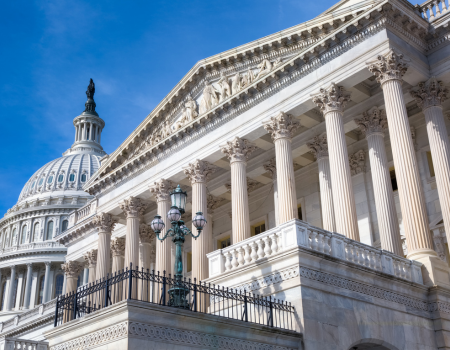
For decades the Strategic Partnerships Team (SPI) has advised companies conducting business in the U.S. government marketplace. Many of our consultants are former government executives and because we provide services throughout the U.S., we closely monitor developments at all levels of government. We research, track, and provide insights into government trends, actions, funding, upcoming opportunities, and anything else that impacts public-private collaborations. Firmly entrenched at the intersection where public entities and private enterprises meet, we keep a close eye on factors that could drive change—and currently, there are significant shifts on the horizon for both sectors.
Congress is debating a budget bill that will impact every public entity, American, and businesses operating in the U.S. Yesterday, the budget bill was passed by one vote in the Senate, and it has now been moved back to the House of Representatives. If there are changes made to it by House members, which is probable, it will then be returned to the Senate for a final vote.
There are several provisions in the current Senate-passed bill that will result in significant changes at the lower levels of government. The bill, in its current state, significantly reduces federal funding support to state and local governments. The funding reductions along with new mandates will result in major restructuring. Here are a few issues worth monitoring. These items, pulled from the current budget bill, are in no particular order of priority:
- Highway and transit funding formulas include increased state cost-share and stricter eligibility requirements. This change will require public officials to provide more matching funds for numerous types of projects.
- Public health block grant funding is reduced, limiting federal support for state and local health departments.
- Disaster relief funding is capped at lower levels and the availability of federal reimbursement funding for state and local disaster response and recovery will be significantly reduced.
- Funding for state and local government cybersecurity grants is reduced, meaning fewer federal dollars will be available to help local IT teams improve security defenses.
- The clean energy tax credits passed by Congress for solar projects will be phased out for any projects that start construction after June 2026 or scheduled to become operational after 2027.
- Electric vehicle tax credits are scheduled to be phased out by September 2025, with EV charging infrastructure tax credits would be phased out by June 2026.
- Fees on methane emissions are postponed for 10 years and tax credits for biofuels are extended for an additional four years.
- An additional $150 billion is allocated for defense spending, including $29 billion for shipbuilding to improve military operations and approximately $25 billion in various military infrastructure and housing improvements.
- States will be required to pick up a greater portion of the Supplemental Nutrition Assistance Program (SNAP) that provides food assistance for low-income families.
- Authority over education will be moved to state and local communities as a result of the U.S. Department of Education being phased out.
- Many federal funding programs may be frozen. Analysts estimate that, based on the bill’s provisions, the financial reduction in federal funding assistance could be approximately $425+ billion.
- Funding for the Border Wall is increased.
- $1 billion in Affordable Housing Preservation funding is halted and federal rent subsidies are reduced.
- $5.4 billion in funding for bridge repairs is preserved, but with new restrictions for the projects.
- Some funding is available to help mitigate the loss of rural hospitals because of the cuts in Medicaid.
- $3 billion in environmental justice block grants is canceled, while funding for community development block grants will be reduced along with clean energy incentives.
- New economic development funding is allocated for oil and gas initiatives while funding for other economic development grant programs will be significantly reduced.
- Federal agencies will see extremely large reductions in funding for ongoing operations and capital projects. There will be more contracting opportunities at the state and local levels of government.
- Billions in funding will be available for air traffic controllers nationwide. Airport upgrades will continue but many will likely be funded through different sources.
- Smart tax provisions will support wireless investment. The bill’s targeted tax incentives will accelerate private investment in next-generation networks.
To summarize, the pending budget bill passed by the Senate and now about to be voted on in the House of Representatives, will likely result in sweeping changes for state and local governments. Simply put, the bill phases out billions in funding support that state and local government entities have relied on for decades and it outlines costly mandates for state and local governments related to education, healthcare, disaster response and recovery, regulatory responsibilities and required funding matches for infrastructure grants.
A brief look at some of the most likely outcomes reveals several anticipated changes that appear obvious:
- State, local and regional government officials will be required to work much closer together in the future.
- Private sector investors will be more commonly welcomed as critical infrastructure projects are planned.
- Developers and regional partners will be highly sought after as collaborators and investors in economic development.
- Technology modernization will not be impaired because it will allow efficiencies and cost reductions that governmental entities must have.
- AI will be at the forefront of helping governmental entities cut costs.
- Immediate contracting opportunities will be available as public officials struggle to build programs that incorporate new mandates. Technology with management solutions will be in high demand.
- Public officials will be more likely to accept meetings with private sector firms with revenue producing offerings.
It is a changing world… and the SPI Team will continue to monitor activities and trends both nationally and internationally to provide insight into the ever-changing marketplaces of government.
